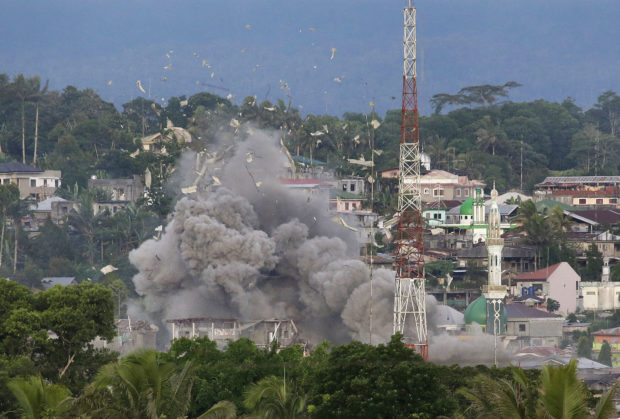Gov’t misses out on growth of terrorist groups

Debris flies in the air as Philippine Air Force fighter jets bomb suspected locations of Muslim militants as fighting continues in Marawi city. AP
MARAWI CITY—As black smoke billows behind lush palm groves, tanks rumble past graceful minarets and bullets rain on empty streets, the question of how a small group of fighters once dismissed by President Duterte as a mere bunch of drug traffickers can seize territory overnight and keep the military at bay for weeks stares government officials in the face.
When the previously little known Maute group and a faction of the Abu Sayyaf bandit group led by Isnilon Hapilon pledged allegiance to Islamic State (IS), the military played it down as propaganda aimed at winning financial support from the jihadist network in Iraq and Syria.
Martial law
But when the Maute group and Hapilon’s band rampaged through Marawi on May 23, seizing and executing Christians, desecrating a cathedral and abducting its priest and followers, and laying siege to the city, President Duterte declared martial law not just in Marawi but in all of Mindanao and suspended the privilege of the writ of habeas corpus on the entire island.
He sent in the military, which found not just a bunch of bandits and narcotraffickers but a well-armed militant force defending seized territory and ready to fight to the death to keep it.
Surprised, the military threw in artillery, armor and attack planes into the fight, sending the more than 200,000 residents fleeing and reducing the city into rubble.
Denial
As the siege of Marawi entered its fourth week on Tuesday, more than 200 people had been killed and much of the city lay in ruins.
The strongest attempt yet by IS supporters to seize and hold territory in Southeast Asia has turned into an urban street fight in what is now largely a ghost town.
“For years, there has been a long denial by the AFP (Armed Forces of the Philippines) of the influence of the Islamic State on the Maute group and Abu Sayyaf,” said professor Julkipli Wadi, who has studied Islamist militancy at the University of the Philippines’ Institute of Islamic Studies.
“The AFP then was plagued by dilemma. If it recognized that early the role of IS in the Maute group, it would have given them what they had long wanted—attention,” Wadi told the Inquirer.
It was a “serious quandary,” as acknowledging the group “would mean [boosting its] image,” which IS could see as a reason to view the Maute as a serious ally in Southeast Asia, Wadi said.
Led by Middle East-educated brothers—Omarkhayam and Abdullah Maute—their group first engaged the government in Lanao del Sur last year, but was pushed back after days of skirmishes.
But the group followed up hard, setting off a bomb at a popular night market in Davao City, Mr. Duterte’s hometown, in September last year, killing 15.
Focus on drugs
Though brutal, the attack merited only little attention in the intelligence community, as the national agenda remained focused on Mr. Duterte’s war on drugs.
That obsessive concentration also made the government miss out on the Maute’s rise as a group of militants aiming to carve an Islamist province out of Philippine territory in Mindanao.
“When they were going around here and telling people to fight for Islamic State, many of us told them to take their fight to the mountains,” a former teacher of Omarkhayam Maute said. “Not in the city, where Muslims and Christians have long coexisted.”
When the Mautes and the black-clad fighters allied with Hapilon seized much of Marawi on May 23, the teacher said he thought the fighting would end quickly.
“We were mistaken,” the teacher said. “The city is now destroyed.” —WITH A REPORT FROM NEW YORK TIMES NEWS SERVICE














